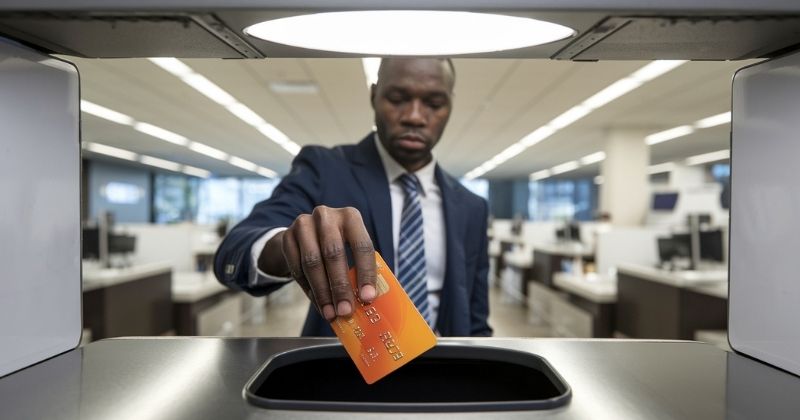
Getting rid of a credit card isn’t as simple as cutting it in half and tossing it aside, despite what films might suggest. The process involves more than just physical destruction. If you’re uncertain about the correct steps to take, there’s no need for concern. We aim to explain how to cancel a credit card properly while helping you avoid any unnecessary complications.
Key Takeaways
- Follow the Proper Cancellation Process: Simply cutting up a credit card does not close the account. To avoid issues, you must settle any outstanding balance, redeem rewards, submit a formal cancellation request, and verify that the closure is reflected in your credit report.
- Cancelling a Credit Card Can Affect Your Credit Score: Shutting down an account might increase your credit usage percentage and decrease the duration of your credit history, which could negatively impact your credit score. Lenders prefer a utilisation ratio below 25%, so reducing available credit could make future borrowing more difficult.
- Consider Alternatives Before Cancelling: Instead of closing the card, you may be able to downgrade to a lower-fee option, reduce your credit limit, or switch to a different rewards programme to retain account benefits while avoiding unnecessary costs.
About Arcadia Finance
Get your loan with ease through Arcadia Finance! No application fees, a seamless process, and access to 19 trusted lenders—all fully compliant with South Africa’s National Credit Regulator. Secure financing that fits your needs effortlessly.
What It Means to Cancel a Credit Card
Cancelling a credit card means closing your account with the issuer, preventing any further transactions or charges. While this can help you manage debt or simplify your finances, it may also impact your credit score, especially if the card has a long history or a high credit limit. Before closing an account, it’s important to pay off any outstanding balance, redeem any rewards, and consider alternative ways to maintain your credit health. Whether you’re switching to a better card or reducing credit exposure, making an informed decision ensures minimal disruption to your financial stability.

Reasons to Cancel a Credit Card
Unlike transactional bank accounts, credit cards provide a credit facility that allows you to borrow funds for purchases. However, over time, you may find that a particular credit card is no longer as useful as it once was. Here are some common reasons for closing a credit card account:

The Benefits Are No Longer Relevant
Credit cards often come with perks such as automatic travel insurance when purchasing flight tickets or cashback rewards at select retailers. However, as your circumstances change, some of these benefits may become less useful.
For instance, an older credit card might offer discounted gym memberships and a set number of free text messages each month. If you now prefer cycling over gym workouts and primarily use WhatsApp instead of SMS, these benefits no longer serve your needs.

High Fees Can Add Up
Even if you haven’t used your old credit card for months, you’ll still be charged a monthly service fee, which can amount to hundreds of rands over time.
If you’re still actively using the card—whether for transfers, payments, or banking notifications—these transactions will come with additional costs. Banks charge for these services, and over time, these fees can make keeping the card more expensive than expected.

Fraudulent Transactions on Your Card
If your credit card is involved in blatant fraud, such as being stolen and used without your consent, your bank will act quickly to cancel it and issue a replacement. However, if the misuse is more subtle—such as unauthorised recurring charges or personal misuse—it may be easier to cancel the card yourself and request a new one.
For instance, you may have subscribed to a news service that refuses to cancel your membership despite multiple requests. Or perhaps a family member continues to use your card despite your instructions not to.
In cases like these, resolving the issue with the service provider or the individual may take time, but cancelling the card ensures that the unwanted charges stop immediately.
If you’ve been a victim of fraud or worried about potential scams, cancelling your credit card may feel like the safest option. However, before making a decision, check out these credit card scams to stay informed about common tactics fraudsters use—and learn how to protect your financial identity!
How to Cancel a Credit Card
If you need to close your credit card account, you will have to follow several steps to ensure the process is completed correctly.
Identify the Correct Contact Person
Determine which department or representative at the credit card company handles cancellations. This information is usually available in the terms and conditions or the advertiser disclosure provided by the issuer.
Settle Any Outstanding Balance
Before closing your credit card, ensure that any remaining balance is fully paid. Leaving an unpaid amount could negatively affect your credit record and result in additional fees. Attempting to cancel a card while it still carries a balance may also complicate the process.
Claim Any Rewards
Many credit cards offer reward programmes designed to encourage usage. If your card includes benefits such as cashback, points, or travel perks, you may have accumulated rewards over time. Before proceeding with cancellation, ensure you have redeemed any available rewards, as they will be forfeited once the account is closed. Check that all pending rewards have been approved and credited to your account.
Contact Your Credit Card Provider
Once your outstanding balance has been settled, contact your credit card provider to confirm that the balance is fully cleared and the account reflects a zero balance. Even if your balance is zero, it is possible that there may be outstanding fees or interest which you will need to pay before they can move to the next step. Only after receiving confirmation can you proceed with the cancellation request.
Submit a Written Cancellation Request
A verbal request over the phone does not serve as official cancellation. You must submit a formal written request to close your account. Ensure that your cancellation letter is properly documented and sent via a trackable method to confirm receipt. Once your provider acknowledges the request, your credit card will be officially closed.
Review Your Credit Report
This is a crucial step in finalising your credit card cancellation. Even if you have settled your balance and submitted a written cancellation request, the credit card provider may not have updated your credit profile. Check your credit report thoroughly to ensure that the account is marked as closed and that all details are accurate.
Properly Dispose of Your Old Card
Once your credit card has been cancelled, you need to ensure it cannot be misused. The safest method is to cut it into multiple pieces, making sure to slice through key details such as the card number, CVV, and chip. For added security, dispose of the pieces separately to prevent any risk of identity theft.

Does Cancelling a Credit Card Affect Your Credit Score?
Before considering the impact of cancelling a credit card, it is useful to understand that there is no single, universal credit score. Each lender evaluates applicants based on its own criteria, using a combination of your application details, credit report, and any past history you may have with them. As a result, cancelling a credit card can influence your score, but the extent of the impact depends on the specific lender.
One potential drawback is an increase in your overall credit utilisation ratio, which refers to the percentage of available credit that you are using. For example, if your total credit limit is R2 000 and you have a balance of R1 000, your credit utilisation is 50%. However, if you cancel a credit card and your total credit limit drops to R1 500, that same R1 000 balance now represents 75% of your available credit.
Lenders assess not only your outstanding debt but also your total available credit when determining whether to approve new credit applications. In general, they prefer applicants to maintain a credit utilisation ratio below 25%.
In some cases, keeping a long-standing, well-managed credit account can work in your favour. A history of responsible borrowing demonstrates reliability, which may reassure lenders that you are likely to repay future credit obligations.
Struggling with a high balance? Instead of canceling your card immediately, explore when to use a personal loan to pay off credit card debt. A well-planned consolidation strategy can help you manage payments more efficiently and improve your financial stability!
Alternatives to Cancelling a Credit Card
Cancelling a credit card is not always the best solution, as it can impact your credit score and financial flexibility. If high fees, lack of use, or changing financial circumstances are prompting you to close an account, there may be better alternatives that allow you to maintain the benefits of an open account while avoiding unnecessary drawbacks.

Downgrading to a Lower-Fee Option
Many credit card issuers offer different tiers of cards, some with reduced annual fees or no fees at all. If your current card has become too expensive to maintain, contact your provider to check whether you can downgrade to a more affordable option. This way, you can keep the account open without paying for benefits you no longer use.

Reducing Your Credit Limit
If you are concerned about overspending or managing multiple lines of credit, reducing your credit limit may be a better option than cancelling the card outright. Most banks allow cardholders to request a lower credit limit, which can help control spending while keeping the account active. This approach also helps maintain a longer credit history, which can be beneficial for your credit score.

Switching to a Different Rewards Programme
If your credit card’s benefits no longer align with your spending habits, you may be able to switch to a different product from the same provider. Many banks offer a range of credit cards with different rewards programmes, such as cashback, travel perks, or retail discounts. Instead of cancelling your card, consider transferring to a programme that better suits your current needs.

How to Rebuild Credit After Cancelling a Credit Card
If cancelling a credit card has negatively affected your credit score, there are steps you can take to strengthen your credit profile over time. Since lenders assess various factors when determining creditworthiness, focusing on responsible financial habits can help restore and maintain a healthy credit record.
1. Maintain On-Time Payments
One of the most effective ways to improve your credit profile is by ensuring all remaining credit accounts—such as other credit cards, store accounts, or loans—are paid on time. Late or missed payments can further damage your credit score, while consistent on-time payments demonstrate responsible borrowing behaviour to potential lenders. Setting up debit orders or payment reminders can help you stay on track.
2. Consider a New Credit Product
If cancelling a credit card has reduced your available credit or shortened your credit history, applying for a new credit product may help rebuild your profile. A low-fee credit card, store account, or personal loan can reintroduce positive credit activity. However, it is essential to use new credit responsibly by keeping balances low and paying the full amount due whenever possible.
3. Monitor Your Credit Report
Regularly reviewing your credit report allows you to track improvements and identify any errors that may be affecting your score. If you notice incorrect information—such as an account that should be marked as closed or a payment mistakenly reported as late—you can dispute these inaccuracies with the relevant credit bureau. Keeping an eye on your report also helps you detect signs of fraud or unauthorised activity.
Conclusion
Cancelling a credit card is a significant financial decision that requires careful consideration. While it may help you avoid fees or remove an unused account, it can also impact your credit score and financial flexibility. Before closing a card, explore alternatives such as reducing your credit limit, switching to a lower-fee option, or transferring to a more suitable rewards programme. If you do proceed with cancellation, ensure that all outstanding balances are settled, rewards are redeemed, and the closure is properly recorded on your credit report. Understanding the potential effects and taking the right steps can help you manage your credit responsibly and avoid unnecessary complications.
Frequently Asked Questions
Yes, cancelling a credit card can affect your credit score by increasing your credit utilisation ratio and reducing your overall credit history length. However, the impact depends on your overall financial profile and how you manage other credit accounts.
In most cases, any unredeemed rewards, cashback, or loyalty points will be forfeited when the account is closed. Before cancelling, check the terms of your rewards programme and redeem any benefits you are entitled to.
You cannot fully close a credit card account until the balance is paid in full. Attempting to cancel while owing money may result in additional interest and fees, so it is best to settle the balance first.
Keeping an old, well-managed credit card open can be beneficial for your credit history and utilisation ratio. If it has high fees or offers no benefits, consider downgrading to a lower-cost option instead of cancelling.
After submitting your cancellation request, check your credit report to ensure that the account is marked as closed. You can also contact your bank for confirmation and request written proof of the account closure.
Fast, uncomplicated, and trustworthy loan comparisons
At Arcadia Finance, you can compare loan offers from multiple lenders with no obligation and free of charge. Get a clear overview of your options and choose the best deal for you.
Fill out our form today to easily compare interest rates from 19 banks and find the right loan for you.


